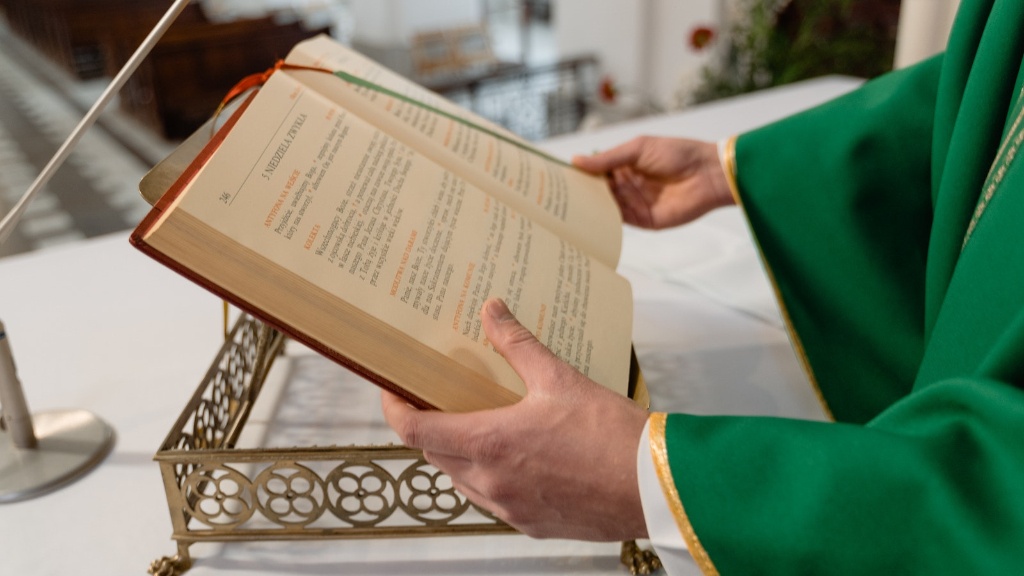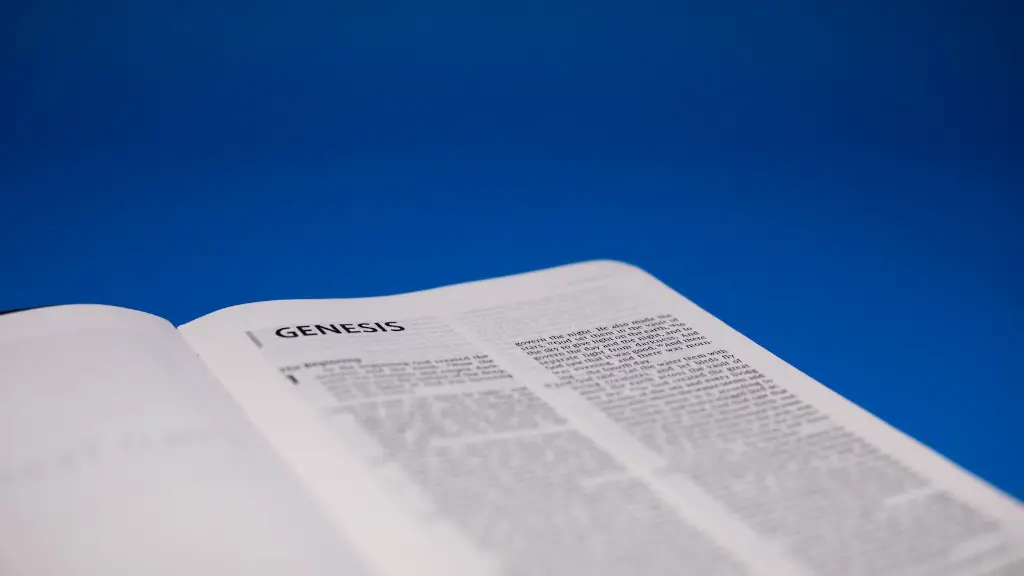When it comes to topics of life and death, one must always consider the morality and reasoning of our decisions. The bible offers a reflection on the subject of euthanasia, with scriptures that contain statements from God, warning us against the active taking of human life. In this article, we’ll look at what the bible says about euthanasia, breaking down its implications for those who follow the religion.
In Christianity, the bible’s fundamental teaching is the belief that all life comes from God, giving each person ultimate authority over it. Consequently, taking another’s life is seen as an immoral act, since it is negating the will of God. As such, passive euthanasia, where passage to death is achieved through the withholding of medical resources, is most common in Christian countries as a more moral solution to allowing a person to die with dignity.
The bible is made up of two main sections, the Old Testament and the New Testament. The Old Testament contains the laws and ethical standards which Christians must abide by, and the New Testament which emphasises the importance of love for those around us. With regards to euthanasia, the Old Testament prohibits taking another’s life, meaning actively causing death is banned, whilst the New Testament is less clear on the issue.
The bible does not specifically compare euthanasia to murder. Instead, it focuses more on the concept of how people should treat one another. This indicates that euthanasia could be allowed depending on the circumstances, as long as it is not seen as an act of hate. On this basis, some experts believe it can fit within a biblical religious framework, so long as it is carried out with respect, love, and compassion for the person who is about to pass away.
In the end, it comes down to personal interpretation of the bible and its teachings. Bible passages can be seen from different views, with no one definitive interpretation. Thus, it is up to the individual to make their own decisions based on their own understanding of the scripture and what it teaches us. For example, some people may feel that active euthanasia should be allowed if it is done with mercy and to spare a loved one from intolerable suffering.
However, it is important to note that many religions and moral codes are opposed to euthanasia, and its legality remains a major moral and ethical debate across the world. For example, it is illegal in most countries, including more countries which take a Roman-Catholic stance. Ultimately, it is up to the individual to make their own decisions when it comes to sensitive topics such as euthanasia, and all should be done with due consideration and respect.
Consequences of Euthanasia
The consequences of a decision to endorse euthanasia can be serious and far reaching, with both legal and criminal implications. Those influenced by the bible have a duty to protect the rights of patients, as well as adhere to the laws and ethical guidelines governing the medical profession. Failing to do so may lead to serious consequences.
In terms of legal implications, it is important to note euthanasia is illegal in most countries. There may also be consequences for physicians carrying out euthanasia, with many countries implementing laws or policies to protect those performing it, or severely punishing those who do not. Additionally, those who have been have been affected by the decision to end a life, such as family members or the patient’s close friends, may be subject to legal action.
Criminal consequences can also follow a decision to proceed with euthanasia. Depending on the country, those performing euthanasia may be viewed as killers. There may even be significant penalties for those who intentionally and knowingly engage in an act which leads to the death of another person. This is why it is important that anyone who is considering euthanasia must understand both the ethical and legal implications before deciding to proceed with the act.
Different Perspectives of Euthanasia
Although the bible provides some guidance on the topic of euthanasia, there are different perspectives to consider. It is important to be aware that not everyone adheres to one interpretation, and even those who follow the bible may have different interpretations.
Many believe that euthanasia, or mercy killing, could be justified in certain circumstances. For example, if a patient is suffering from an incurable or terminal illness, or if the patient or their doctor believes that the pain and suffering of the remaining days are too much to bear. In those cases, euthanasia could be seen as an act of compassion.
On the other hand, some argue that euthanasia should never be a viable option, regardless of the circumstances. They point to the very nature of life being a precious gift from God, and that choosing to end it in any circumstances would be seen as a disrespectful act. Those who believe life should never be taken by our own hands, believe that suffering should be embraced as a path to redemption and spiritual growth.
At the end of the day, euthanasia remains a controversial and subjective topic and opinions on it differ greatly. It is important to assess both sides of the argument and make your own decision, particularly when taking religious beliefs into consideration.
Euthanasia and End of Life Care
Euthanasia is often considered by those who are facing a terminal illness or have a very poor quality of life. In such cases, the patient’s wellbeing should be the priority, which is why end of life care is so important. End of life care is designed with the goal of providing a good quality of life and a dignified death.
End of life care involves providing medical, psychological, and social support for individuals nearing the end of their life. This care aims to reduce suffering and promote physical, emotional, and spiritual wellbeing in the patient. End of life care is also provided to family members, who face difficult challenges as they prepare to say goodbye to their loved one.
Despite the difficulties of end of life care, it allows individuals to spend their final days in comfort and with dignity. End of life care can be provided in the patient’s own home or in a hospice setting, with medical staff on hand to support them if necessary. This care usually includes pain relief, psychological care and counselling, comfort care, and spiritual counselling or support.
Many organisations and charities now provide end of life care, including hospices, palliative care units, and specialist teams. These services allow individuals to access good quality care to make the most of their final days. Additionally, religious organisations are stepping in to offer their help in order to ensure that individuals receive the care they need to make the most of their final moments.
Ethical Implications of Euthanasia
The bible offers an insight into the ethical implications of euthanasia, urging believers to respect life as a sacred gift from God. However, euthanasia remains a complex ethical issue, with many involved parties for and against it.
There are those who believe euthanasia should be seen as a form of medical care, and that it should be used to relieve the patient from suffering. They argue that active euthanasia may be the best option in some cases, and that it should be seen as an acceptable medical practice for individuals with a terminal illness or those suffering from unbearable pain.
Others argue that it is contrary to accepted medical and moral principles, because it involves taking actions that would normally be considered as unethical. They argue that it cannot be seen as a form of medical care, as it involves taking the life of another and thus exists outside of accepted medical practice.
When it comes to euthanasia, it is important to consider all ethical implications. It is a complex decision, and each case should be assessed on the individual’s unique circumstances. All should be aware of the potential legal, criminal, and ethical implications of making a decision to endorse euthanasia.
Religious Standpoints on Euthanasia
Religious leaders have different opinions on euthanasia, including whether it should be seen as an acceptable medical practice or a violation of religious principles. Most of the Abrahamic religions such as Christianity and Islam maintain a pro-life stance, believing that life is a sacred gift from God and should be respected and protected.
In the Christian faith, it is believed that every human life is created in the image of God, and taking it away is seen as a violation of divine will. On this basis, many Christians are opposed to any form of euthanasia, claiming that it is taking away the responsibility and authority God gave to each individual.
Furthermore, the bible is silent on passive euthanasia and the withholding of medical technology, techniques, and medications. Yet many Christians still consider this to be acceptable, believing that it is not in violation of the divine will of God.
Despite differing opinions, most religious leaders agree that euthanasia should never be seen as a viable option unless all other possible treatments are unavailable. They also maintain that an individual facing a terminal illness should receive the best quality of care available in order to ensure both a comfortable and dignified death.
Euthanasia in Contemporary Society
Currently, euthanasia remains a highly sensitive and divisive subject, with countries having vastly different laws governing it. In the United States, euthanasia is currently illegal, and only medical treatments such as withholding medical resources or comfort-care are allowed. In other countries, such as Canada and the Netherlands, assisted suicide is legal and individuals are able to opt for it as a viable medical option.
In recent years, the discussion surrounding euthanasia has become increasingly prominent as medical technology and treatments have advanced. With improved treatment options, believes that euthanasia may be an acceptable medical practice have grown. Debate is ongoing, as many consider euthanasia to be morally wrong and a violation of human life.
Hence, it falls on each individual to consider the moral and ethical implications of euthanasia when making a decision on the matter. Those influenced by the bible may find the scriptures useful when making their decision, but in the end it is up to each to make their own judgement on the matter, considering both sides of the argument and their own personal beliefs.





